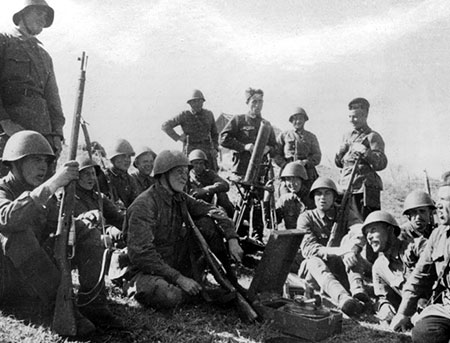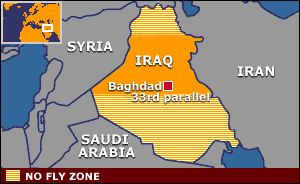Translated by Ollie Richardson for Fort Russ
8th April, 2016
The website of the TV channel "Tvzvezda" has published a series of articles on the great Patriotic war of 1941-1945 by writer Leonid Maslovsky, based on his book "Russkaya Pravda", published in 2011.
In his opinion articles, Maslovsky reveals "the myths of the imaginary foe, Russia, and the events of the great Patriotic war, showing the greatness of our Victory." The author notes that in his articles he is going to "show the US' unhelpful role in West Germany's preparations for war with the USSR".
Kharkiv slaughter: How "brilliant leader" Khrushchev killed thousands of soldiers
The balance of forces on the Soviet-German front by May 1942 was as follows: the Red Army had 5.1 million people (without air defense forces and the Navy), almost 3,900 tanks, 44,900 guns and mortars, and about 2,200 combat aircraft.
The Nazi army had 6.2 million people, 3,229 tanks and assault guns, 57,000 guns and mortars, and 3395 combat aircraft. Please note: Germany and allies had 1.1 million more soldiers and officers compared to our ground forces. The superiority in the number of German & ally troops remained from the first day of the war until 1943.
But already in the summer of 1943 the number of troops of the Red Army exceeded the number of German troops by 1.8 million people. And some people say that the armies of the USSR lost more troops than Germany and its allies!
In the summer of 1942, Germany had superior guns and aircraft. We had a slight superiority in tanks, but light tanks still constituted a large proportion of our units.
The largest grouping of German troops (more than 70 divisions) was in the Moscow area. On May 1st, 1942, 217 divisions operated on the Soviet-German front (German numbers were approximately twice as high as the divisions of the Soviet armed forces) and 20 brigades of the enemy, that is, about 80% of all the land forces of Germany and its allies, as well as three of the five German air fleets. In connection with this fact, the Stavka did not move their troops from the West to the South-West direction.
And whatever may be said, in my opinion, this was the right decision, like the decision to place strategic reserves in the area of Tula, Voronezh, Stalingrad, and Saratov.
More of our energy and resources were focused on the southwest and West. Ultimately, such a distribution of forces led to the defeat of the German, or rather European army, and it was therefore inappropriate to speak about the wrong distribution of our troops by the summer of 1942. It is through this distribution of troops that we had the opportunity in November to gather sufficient strength to defeat the enemy at Stalingrad, and were able to replenish our troops during defensive battles.

While the Germans were engaged in Kerch, the commander of the southwestern front, S.K Timoshenko, came to the Stavka with a proposal to conduct a major offensive at Kharkov, and sent a plan of operations. S.K Timoshenko and N. Khrushchev insisted on the implementation of the plan. Stalin agreed to conduct operations with forces of the southwestern front involving troops of the southern front. In this instance, our intelligence once again performed badly, and Timoshenko did not know that the Germans, on May 18th, had prepared "Operation Fridericus-1" to eliminate the Barvenkovsky protrusion so that the area could be used as a place to concentrate troops for the upcoming attack to the East.
Hoping for an equal balance of forces and means, which there was in the beginning of the offensive, our troops went into the thick of the forthcoming summer offensive of the German armies. Upon the delivery of the report of the General Staff on 17th May, 1942, Stalin proposed to stop the offensive due to the impact of the Germans from the South. Timoshenko and Khrushchev assured that the situation in the South would be back to normal soon. On May 18th, Stalin again spoke with Timoshenko and again received soothing assurances.

Only in the evening of 18th May did Timoshenko and Khrushchev raise the alarm and began to demand the cessation of the offensive. Stalin was outraged. They demanded an end to the offensive for the same reasons that Stalin had just warned them. At the time, they objected and continued the attack, and on the evening of May 18th, began to speak the words of Stalin on their behalf. After a few hours, Stalin gave permission for the cessation of the offensive on Kharkov, realizing that it was too late.
On May 19th, the impact grouping of our troops advancing on Kharkov was stopped by Timoshenko. As a result of the irresponsible offensive, the three armies in the South and South-Western fronts suffered heavy casualties. The impact troops of the southwestern front were surrounded. Forces from the 32nd army rescued 22,000 people from the encirclement. Part of the soldiers and commanders managed to break through in small groups and go to the eastern bank of the northern Donets.
Timoshenko and Khrushchev should have been prosecuted, but they got off lightly. Stalin took the blame because he was the one who allowed the attack on Kharkov to begin.
In mid-June, the South-Western front, under the blows of the German troops, were twice forced to retreat and withdraw across the river Oskol. The Kharkov battle lasted from the 12th to the 29th of May, 1942. The defeat at Kharkov, and then in Crimea showed that by the summer of 1942 the Germans once again became stronger than us.
As a result, we did not dislodge the Germans from Kharkov, and the Germans pushed us out of the Barvenkovsky protrusion, and we lost an important operational bridgehead on the northern Donets. The troops of the southwestern and southern fronts suffered heavy losses in manpower and equipment. Our historians do not analyse these events, and write that, according to German military command, in the battles at Kharkov the Germans captured 240,000 prisoners.

The analysis shows that the German command never in all of the war told the truth about the number of our prisoners that were captured. And if you believe them, then in 1941 the Germans captured all surviving officers and soldiers of the Red Army. In fact, our army only managed to grind the fresh German division and army coming and going from Europe. England and the United States calmly watched as we bled in the fight. In their favour was the fact that the Germans did not shed any less blood than us, and November 19th, 1942, more so than us.
The number of our soldiers and officers captured in Kharkov is greatly exaggerated. The Germans actually indicate not the number taken prisoner, and their calculations exaggerated the initial number of staff of our armies advancing on Kharkiv. Here the 6th army and task force of the Southwest front, coming from the Barvenkovsky protrusion, and also the 28th army's secondary attack of Kharkov from the district of Volchansk, struck the main blow. Germans included in number of prisoners also the numbers of the 9th army of the Southern front holding the defence from the South near where the 57th army held the defence.
German data is not true, because first of all, not all but part of forces of the three armies were surrounded (according to Vasilevsky and our historians, they were all surrounded by impact troops); secondly, our troops after the German attack for nearly two weeks fought fierce battles and had large losses; thirdly, some of our officers and soldiers came from the environment and therefore the number of Germans taken prisoner by our military may not have exceeded 20,000 people. Thousands of people taken into captivity is a lot.
I think that along with the dead, we lost about 80,000 people in this battle. We must remember that at that time our army had a strength of much (often almost double) below what was authorized. In my opinion, regardless of whether we would keep the defense of the Barvenkovsky protrusion or, as actually happened, we began the offensive on Kharkov, in any case, we would have crumbled and would have left a foothold, because our troops, exhausted from fighting in the offensive that liberated hundreds of thousands of square meters of his native land, was in need of rest, replenishment of men, and ammunition and equipment. After losing the battle of Kharkov, we had lost the bridgehead on the Northern Donets - Barvenkovsky protrusion.
The Supreme command needed larger reserves for planning offensive operations. Therefore, the General Staff did not plan any major offensive operations in the summer of 1942. But against the German forces, surpassing the Red Army by 1.1 million people, we could not hold the defense on the direction of the main attack for long, and were forced to retreat under the threat of encirclement.
It was impossible to compensate for the missing numbers with the number of artillery, aircraft, and other weapons, as evacation operations has only just started to operate at full capacity, and the military industry of Europe was superior to the military industry of the Soviet Union.
And the threat of encirclement was real. "On June 28th, the Nazi group forces of Colonel-General Weichs went on the offensive from the areas East of Kursk. The Nazi command counted on this attack and blows from Volchansk to Voronezh to surround and destroy the troops of the Bryansk front, covering the Voronezh direction, and then turning to the South, with an additional impact near Slavyansk, to destroy the troops of the southwestern and southern fronts, and to open the way to the Volga and the North Caucasus," writes A.M Vasilevsky.
The commanders of these fronts were, respectively, F.I Golikov, S.K Timoshenko, and Malinovsky. In the future, the Bryansk front was divided into two: Bryansk and Voronezh. On 14.07.1942, Lieutenant-General N. F. Vatutin was appointed the commander of the Voronezh front.
During the decision on the choice of the front commander, Vatutin worked as Deputy Chief of the General Staff. All candidates who Vasilevsky, with Vatutin, offered the post of commander of the Voronezh front, Stalin assigned. "All of a sudden Nikolai Fedorovich stood up (says the chief of the General staff A. M. Vasilevsky) and said:
"Comrade Stalin! Assign me as commander of the Voronezh front.
"You?"And Stalin raised his eyebrows.
"I supported Vatutin, although was sorry to let him go from the General Staff."
Stalin paused, looked at me and said:
"Okay. If comrade Vasilevsky agrees with you, I don't mind."
So N.F Vatutin was the commander of the Voronezh, then southwest front, which, subordinated to the main force of our troops, defeated the Germans at Stalingrad.
The problem of the destruction of the three fronts was entrusted to the German group of the "South" armies, which was later divided into two groups of armies: "B", under the command of field Marshal F. Bock, and "A" - under the command of field Marshal V. Liszt. They had distinguished themselves by their atrocities in Yugoslavia and Greece.
The Stavka, if necessary, reinforce the troops of these fronts, and because of this, as well as the skilful actions of the General Staff and the commanders of the Soviet troops, the Germans were unable to achieve their goals in the environment and the destruction of the divisions, corps, and armies of our fronts. Under fighting our troops departed to the East.
This is just how K.K Rokossovsky, on July 5th, 1942, was appointed to his post as commander of the 16th army force commander of the Bryansk front, one of the battles in the Voronezh direction: "On the land where the battles were part of the 5th tank army, the situation was deteriorating: the enemy continued to advance. It was necessary to urgently bring new strength. We decided to push the front line with the reserve 7th armored corps under the command of P.A Rotmistrov.
While at an observation post in the area where the events were unfolding, you could see the whole course of the battle. Flat, open terrain contributed to this. Fighting with our departing units and those who were pressing on their opponent were clearly visible. Enemy tanks could be seen in small groups on a broad front, taking cannon fire, mainly intervalic in nature.
German infantry was moving behind them, lying from time to time and taking continuous automatic fire. In the distance, on the horizon, through the thick clouds of dust, the movement of new columns of tanks and other vehicles were observed.
Our anti-tank artillery quite accurately beat the advancing tanks of the enemy. Where possible it changed positions and immediately opened fire, slowing the enemy advance and covering our departing infantry, which also fought back with machine-gun and mortar fire. The withdrawal had an organized character. But it was obvious that, entering into battle with their main force, approaching from the depths, the enemy will easily crush our units.
However, by this time part of the 7th tank corps arrived. Before our eyes, the corps turned and resolutely marched towards the main tank forces of the enemy, hitting them with all our batteries, including the artillery and tank corps. Particularly effective were the "Katyusha" volleys.
The battlefield was shrouded in clouds of dust. Through them shone a dim flash of gunfire and shell explosions. In many places pillars of black smoke soared from burning enemy vehicles. Our infantry rallied and, together with tanks, rushed to the enemy. The enemy could not resist this fierce and swift attack. After heavy losses, they withdrew.
Enemy aircraft, except for certain aircraft, almost did not participate in combat. Nor did our aircraft. All our attempts to build on the progress in this area did not produce results. But the offensive was repelled. In these battles, the commander of the 5th Panzer army, General Lizyukov, was killed (tank units, aviation, and the Generals went on the attack). He was moving in the combat formation of one of the connections. To inspire tankmen, the general rushed forth in his KV tank, rushed into an arrangement of the opponent and laid down his life." The Germans were rapidly advancing, which was facilitated by the superiority in forces and natural conditions of the region.
On 6th July, 1942, street fighting began for Voronezh, in which Soviet troops held the left side of the city and the bridgehead on the right Bank. Nazi occupiers had driven out all the civilian population of the captured parts of Voronezh, destroyed over 2,000 people, who were executed on the outskirts of the city in Pishchane and more than 500 wounded and sick who were in the city hospital.
Follow us on Facebook!  Follow us on Twitter!
Follow us on Twitter!  Donate!
Donate!






































































































